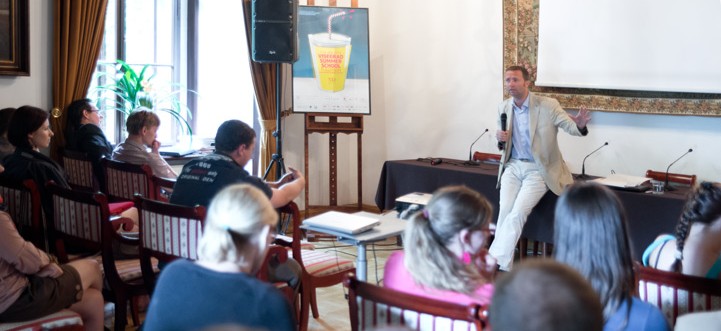
Friday July 13th marked the culmination of what has unquestionably been the best edition of the Visegrad Summer School since its inception in 2002. The opening lecture of the final day was given by Michal Kořan on the topic of Visegrad cooperation. This lecture proved to be the final one of the event, but it was unquestionably one of the more relevant ones to the idea of Visegrad cooperation. Opening the lecture by outlining the strengths of the Visegrad Group, Mr. Kořan explained that it was the 3rd most effective group of its kind in Europe today after the Benelux group and the Nordic Council. He explained how the countries of the region had fought against the odds for many years and the group now gave these nations the scope to fulfil their objectives. Providing a detailed historical overview of issues within the region stemming back to the days of communism, he emphasised the unique nature of the group and its many achievements since its inception.
Giving a brief but detailed insight into the origins of the group, he explained in a thoughtful manner how the first meeting of the countries in Bratislava was not at all successful, he outlined the transformation that has taken place since then particularly after 1998. Emphasising how the Visegrad Group has overcome a lot of problematic phases he illustrated through many symbolic examples the change that has occurred with this group over the last twenty years. He stressed the importance of a regional group of forming a pattern of communication and explained clearly how the Visegrad Group had created such a pattern. The similar socio-economic backgrounds of the nations really helped foster a unique group that has certainly overcome its share of problems. Alluding to the term self-binding Mr. Kořan outlined some of these issues before allowing the audience to interact with him on such a sensitive and emotive topic.
Continuing the lecture in a fast paced manner Mr. Kořan outlined his own belief that political determination and will were two major factors in the evolution of the group and the examples of this are clear since 1999. However, eager not to deliver an overly positive lecture he explained how many challenges still exist for the Visegrad Group such as European integration and the role of NATO. Therefore he stressed that the continued cooperation of all Visegrad Group members is essential for the continued success of this organisation. He outlined some of the group’s achievements such as the rolling presidency every year or the close relationship that now exists between the governments of these four countries. These achievements certainly reflect well on a group that is only twenty years in existence and were highlighted by the speaker as significant signs of how groups such as these come to symbolise success.
Concluding this captivating lecture by giving his own personal perspectives on the aforementioned subject, Mr. Kořan warned of the dangers of a split in the E.U. may have on the Visegrad Group. However, not wishing to be overly pessimistic he once again reiterated his praise of the group and lauded its wonderful achievements in what has been such a short period of time. Thanking the audience for their attention and focus, he expressed his delight at having the opportunity to speak to so many young and enthusiastic people about an issue that he truly believed in.
Giving a brief but detailed insight into the origins of the group, he explained in a thoughtful manner how the first meeting of the countries in Bratislava was not at all successful, he outlined the transformation that has taken place since then particularly after 1998. Emphasising how the Visegrad Group has overcome a lot of problematic phases he illustrated through many symbolic examples the change that has occurred with this group over the last twenty years. He stressed the importance of a regional group of forming a pattern of communication and explained clearly how the Visegrad Group had created such a pattern. The similar socio-economic backgrounds of the nations really helped foster a unique group that has certainly overcome its share of problems. Alluding to the term self-binding Mr. Kořan outlined some of these issues before allowing the audience to interact with him on such a sensitive and emotive topic.
Continuing the lecture in a fast paced manner Mr. Kořan outlined his own belief that political determination and will were two major factors in the evolution of the group and the examples of this are clear since 1999. However, eager not to deliver an overly positive lecture he explained how many challenges still exist for the Visegrad Group such as European integration and the role of NATO. Therefore he stressed that the continued cooperation of all Visegrad Group members is essential for the continued success of this organisation. He outlined some of the group’s achievements such as the rolling presidency every year or the close relationship that now exists between the governments of these four countries. These achievements certainly reflect well on a group that is only twenty years in existence and were highlighted by the speaker as significant signs of how groups such as these come to symbolise success.
Concluding this captivating lecture by giving his own personal perspectives on the aforementioned subject, Mr. Kořan warned of the dangers of a split in the E.U. may have on the Visegrad Group. However, not wishing to be overly pessimistic he once again reiterated his praise of the group and lauded its wonderful achievements in what has been such a short period of time. Thanking the audience for their attention and focus, he expressed his delight at having the opportunity to speak to so many young and enthusiastic people about an issue that he truly believed in.













